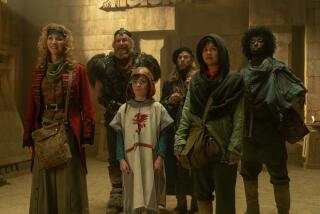TV REVIEW : ‘Raven’: A Martial-Arts Fest on CBS
- Share via
What won’t most viewers be doing after viewing CBS’ new action-adventure series? Answer: “Raven.” Pardon our pun, but a show by that name, even if it weren’t as silly as this one, would in any case virtually cry out for a one-word review: nevermore .
In this martial-arts fest (premiering with a 90-minute episode tonight at 9 on Channels 2 and 8), Jeffrey Meek stars as the title hero and “the only Westerner to have survived training with the Black Dragons,” a super-secret cabal of deadly Japanese gangsters.
He broods plenty because he’s going to be spending the series searching for his son, whom the baddies apparently have. On the other hand, he cracks wise like crazy, in the manner demanded of action figures in the Joel Silver era. He’s a meditating post-Carradine grasshopper, he’s a James Bond-style lethal cutup and he’s a caring father figure.
All he needs is a buddy, and he picks up a sidekick in the form of a likewise witticism-spouting, recovering-drunk veteran played by Lee Majors--yes, that Lee Majors--as a sort of cross between Tom Waits and Grizzly Adams.
The action here takes place in Hawaii, though most of the supporting characters, sympathetic or sinister, are Japanese. The yakuza villains, who announce their badness by scowling, squinting and wearing nappy suits at every possible moment, could be right out of a 1940s serial. But to suggest that it reinforces stereotypes would be to endow the show with a consistency of personality it never achieves and a weight it hardly deserves.
At times, “Raven” virtually demands not to be taken seriously: After being asked by an unwitting thug if he’s “got some kind of deadly disease,” Raven answers, “No, I am some kind of deadly disease,” then, before letting loose with the inevitable flailing limbs, adds, “I have always wanted to say something like that.” Yet that kind of self-referential cuteness never translates to the earnest scenes in which Raven becomes the great protector of lost children, or the equally earnest close-ups of women’s legs in nightclubs.
There aren’t even that many thrills in the sword fight and hand-to-hand combat scenes, which seem unduly tame for the sake of network standards and practices--though, in a running gag, Majors has some fun producing endless numbers of pistols that get consistently kicked out of his hands. Mostly it’s a kung-fumble.
More to Read
The complete guide to home viewing
Get Screen Gab for everything about the TV shows and streaming movies everyone’s talking about.
You may occasionally receive promotional content from the Los Angeles Times.






